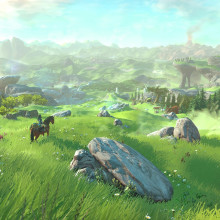Gossip Stone: How Important Is The Zelda Timeline To You?
Posted on March 06 2015 by Ozzy Sezer
 The timeline of the Zelda series has been something at the forefront of debates for numerous years. Many fans, myself included, theorized on the timeline a long time before there was an official announcement. If you aren’t familiar with this term, a timeline places all of the games in a series in some sort of chronological order, usually taking place in the same dimension. What makes it confusing is not only the complexity of the Zelda games, but also that they’re never released in any sort of sequential order, so it was solely up to the fans to speculate the potential timeline.
The timeline of the Zelda series has been something at the forefront of debates for numerous years. Many fans, myself included, theorized on the timeline a long time before there was an official announcement. If you aren’t familiar with this term, a timeline places all of the games in a series in some sort of chronological order, usually taking place in the same dimension. What makes it confusing is not only the complexity of the Zelda games, but also that they’re never released in any sort of sequential order, so it was solely up to the fans to speculate the potential timeline.
There were lots of timeline theories out there, some more farfetched than others, but for me there were 2 main theories that Zelda fans got behind. The first was the ‘linear timeline theory’, where all Zelda titles were placed in a straight order, one after another. The other was the ‘split timeline theory’, which was largely centered on the ending of Ocarina of Time.
Definitely the more complex of the two, this theory had the timeline split at the end of Ocarina of Time and branch off in to 2, or even 3 segments based on different outcomes at the end of the game. I chose to follow this theory, because I felt with the complexity of a lot of the games, including a time travel element amongst other things, it seemed to make more sense than the other simper theory. A lot of games were quite shady in their placement on the timeline, so a more complex theory I thought suited the series better.
Fast forward to 2011, and the first official indication of a games placement came with the release of Skyward Sword in November, and it happened to be the first title chronologically of all the games. While it didn’t really affect a lot of the debated issues, it was nice to see it placed somewhere definitively. Not long after, Nintendo finally broke their silence with the release of a book called ‘Hyrule Historia’ revealing for the first time, an official timeline. Indeed, the ‘split timeline’ theory was proven to be correct, with Ocarina of Time being the focal point in the timeline. The official timeline looks like this.
With the announcement and all other possible theories put to bed, it begs the question; how much did you care about the timeline before it was revealed?
Personally, it was something that had always intrigued me. To think about the Zelda universe on a grander scale outside of each title is pretty daunting, but I always found myself wanting to know more. For example, now that we know the official timeline, playing out each branch of the timeline in order is something that interests me, albeit a lengthy process. Some may feel the same, whereas others may be completely content enjoying each game individually for it’s own beauty and storyline, without any need to connect the dots between them.

Lastly, where does this leave us with the latest title in the series, Zelda U? Exactly where Zelda U will fit in to the timeline is one of the few things we are able to theorize on. There are rumors of it being either a direct sequel or prequel to Skyward Sword, which remember is the very first entry so far. Perhaps this explains the plain grass and empty open fields seen in the trailer where big cities, such as Hyrule, are yet to be formed as the first places on land. Also, the seemingly advanced technology used by both Link and the monster chasing him further suggest it could be a prequel. This is because in Skyward Sword it is seen that an advanced technology once existed and was used by an ancient civilization in Lanayru Desert, which looks vaguely similar to what we see in the trailer. Of course this is all just speculation right now, but who doesn’t love a good theory?
How important is the timeline to the Legend of Zelda series? Does it factor in on the quality of the franchise, or is that measured purely by the quality of the titles released? Let us know your thoughts!



